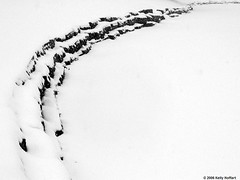Winter Photography
Taking pictures of wintery landscapes can be a lot of fun, if you don't mind the cold, and the results can be quite beautiful. But there are a few things you should know.
When your camera's light meter takes a reading, it assumes that your scene has an average range of tones. But in fact, your winter landscapes will be mostly white, thereby fooling your camera's light meter. So you'll end up with this:

When your picture should look like this:

Now, sometimes this will be OK and you can fix it in Photoshop. But it's always best to do it right in the first place--or at least get it closer to being right. One thing you can do is to use a gray card. A gray card, which should be available at any photography specialty store, is a card that is precisely 50% gray. If you point your camera at it in your current lighting situation, you can get a light meter reading which you can then use when you take your shot.
EXTRA TIP: You could make your own gray card very easily. Just point your camera at something that's completely white, let it take its own exposure reading, and snap the picture. Then print this picture off as a 5x7 and take it with you as a gray card!
Alternatively, you could just set your exposure compensation to overexpose all your shots by about 2/3 to 1 2/3 stops. Experiment to find the right setting.
Another problem with digital cameras and auto-white balance is that many of your pictures will come out with a blue cast to them, at least on days with a clear sky. You could try messing around with custom white balances, but that's a pain. Personally, I think this issue is probably easier dealt with in Photoshop. But your camera may have a special mode dedicated to snowy scenes, as mine does. This mode may also compensate for the exposure issues mentioned above.
So when the snow starts falling, get out there and shoot, but remember that snow will trick your camera almost every time, if you don't outsmart your camera first.

0 Comments:
Post a Comment
<< Home